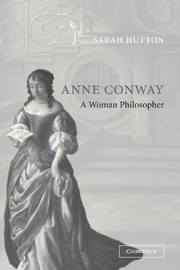Book contents
- Frontmatter
- Contents
- Acknowledgements
- Introduction
- 1 Anne Finch, Viscountess Conway
- 2 A philosophical education
- 3 Religion and Anne Conway
- 4 Anne Conway and Henry More
- 5 John Finch, Thomas Hobbes and Margaret Cavendish
- 6 Experimental physick: Boyle, Greatrakes, Stubbe
- 7 Physic and philosophy: Van Helmont, father and son
- 8 Kabbalistical dialogues
- 9 Quakerism and George Keith
- 10 Last years
- 11 Legacy
- Bibliography
- Index
4 - Anne Conway and Henry More
Published online by Cambridge University Press: 22 September 2009
- Frontmatter
- Contents
- Acknowledgements
- Introduction
- 1 Anne Finch, Viscountess Conway
- 2 A philosophical education
- 3 Religion and Anne Conway
- 4 Anne Conway and Henry More
- 5 John Finch, Thomas Hobbes and Margaret Cavendish
- 6 Experimental physick: Boyle, Greatrakes, Stubbe
- 7 Physic and philosophy: Van Helmont, father and son
- 8 Kabbalistical dialogues
- 9 Quakerism and George Keith
- 10 Last years
- 11 Legacy
- Bibliography
- Index
Summary
‘Your Ladiships humbly-devoted Servant’
In Anne Conway's immediate circle three figures played an especially important part in her intellectual life: her brother John Finch, her teacher Henry More, and the companion of her last years, Francis Mercury van Helmont. Of these, it would be difficult to overestimate the significance for her of Henry More. Not only, as we have seen, was More responsible for her initial philosophical education, but he became and remained a personal friend for the rest of her life. This does not mean that they were of like mind in all things. On the contrary, in her religious life (by her sympathy with and ultimate conversion to Quakerism) and in her philosophy (especially her repudiation of dualism), Anne Conway would take a position independent of his. And at times she was directly critical of his theories. In her later years there is no doubt that Francis Mercury van Helmont came to be another strong influence. But in Henry More Anne Conway had a loyal intellectual companion, with whom she could discuss philosophical and religious issues, and who remained in close contact with her for longer than any other individual apart from her husband. The prolonged absence of John Finch in Italy, and later in Turkey, probably reinforced Anne Conway's reliance on More as a substitute intellectual companion.
- Type
- Chapter
- Information
- Anne ConwayA Woman Philosopher, pp. 73 - 93Publisher: Cambridge University PressPrint publication year: 2004



